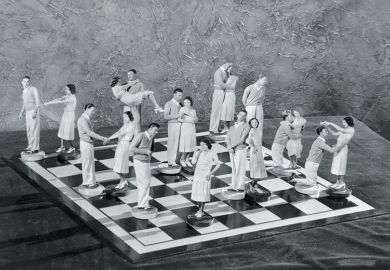Susanna Paasonen’s new book aims to reconsider sex through the lens of play. It draws together collaborative work on girls’ online practices of sexual messaging; an interest in Jan Soldat’s documentary films on German kink communities; reflections on Fifty Shades of Grey; and the role-playing phenomenon of adult babies.
The author’s work comes out of affect theory, in which scholars in a wide range of disciplines have looked to psychologist Silvan Tomkins’ work to underscore affect as a precognitive component of emotion, and a non-linguistic bodily sensation – the sensation before it is interpreted as emotion. The “turn to affect” in the humanities re-emphasised sensations and bodily responses, in a turn against what it saw as an excessive emphasis on language in previous decades.
Paasonen has used affect theory to important ends in her work. In Carnal Resonance: Affect and Online Pornography (2011), she captured phenomena relating to the affects and effects of watching pornography, while refusing to endorse pre-established ways of discussing it. This enabled her to sidestep and defuse some of the more entrenched discursive positions around pornography, by introducing more detail and nuance into what it is to be affected and moved by the genre.
This attention to texture is evident here too. Paasonen is receptive to the multiple resonances of play – games, theatre, performance, pretence, recreation and lightness, among others. She concedes that the rubric of play, with its connotations of fun and spontaneity, might risk downplaying the vulnerabilities and anxieties involved in sex, and is at pains to point out that play is not necessarily “fully free, voluntary, egalitarian, and exclusively connected to positive affect”. It can, she writes, be “asymmetrical, risky, hurtful, violent and damaging”.
Yet Paasonen glosses rather lightly over the troubling coercive elements that can be part of sex as play, particularly play understood as a game, in which disregard for the boundaries of a playing partner can be inherent, as can be coercive means justifying the ends (for example, in the logic of male pick-up artists).
She also uses the concepts of play and playfulness to erode some of the norms and dualisms through which sexual lives are often understood: straight/queer, childhood/adulthood, normality/deviancy, fantasy/reality. She writes compellingly about how paying attention to sex as play “pushes the boundaries of previously defined or recognized sexual tastes and preferences”. In fact, some of the most interesting material here is on how attention to “bodily potentialities” – the affects of sex – might undermine ways of understanding sexuality through mutually exclusive categories, whether of sexual tastes, desires or gender identities. Play has important things to teach us about the categories of identity.
Play as a phenomenon in Paasonen’s hands, however, can be pretty much anything; and when something can be anything, it risks being nothing. In lending itself to so many concerns, agendas and realms, play risks tipping the book from suggestive complexity to cluttered emptiness. The author’s skill in evoking the “physical intensities of arousal and pleasure”, the “thick materiality and humming desires of bodies, their carnal capacities and potentialities”, becomes, curiously, both the book’s virtue and its flaw. As such, it showcases what can be both compelling and frustrating about affect theory; in trying to say so much, Paasonen has written a book that says strangely little.
Katherine Angel is a lecturer in creative writing at Birkbeck, University of London.
Many Splendored Things: Thinking Sex and Play
By Susanna Paasonen
Goldsmith's Press, 208pp, £20.00
ISBN 9781906897826
Published 16 October 2018
Register to continue
Why register?
- Registration is free and only takes a moment
- Once registered, you can read 3 articles a month
- Sign up for our newsletter
Subscribe
Or subscribe for unlimited access to:
- Unlimited access to news, views, insights & reviews
- Digital editions
- Digital access to THE’s university and college rankings analysis
Already registered or a current subscriber?







